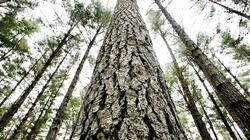Stuff | 22 August 2023
Carbon forestry is pushing up farm prices out of reach
by Gerhard Uys
Carbon forestry is pushing up farm prices out of reach
by Gerhard Uys
A farmer who was outbid by a forestry company when she tried to buy a new farm says carbon forestry is pushing up land prices to levels farmers cannot afford.
Gisborne sheep and beef farmer Kerry Worsnop said she attempted to buy a farm on three occasions but was outbid by forestry companies each time.
She now withdrew from bidding if a forestry company was also interested in a farm, Worsnop said.
Instead she has leased land and did not see an opportunity to buy land soon, she said.
The Government was recently warned that carbon forestry needed a rethink as it could not be the only solution for carbon reduction.
Forestry also came under scrutiny after forestry slash caused devastation after flooding caused by cyclone Gabrielle.
Worsnop said the market was at a standstill after the Government announced reviews into forestry and the Emissions Trading Scheme.
“The fact that none of those transactions are happening tells you [it] had nothing to do with timber. It had everything to do with carbon,” she said.
Because carbon forestry pushed up land prices so much, there would be a huge price correction and contraction in land value if carbon forestry was stopped, she said.
This would have implications for banks, the rural economy and everyone who bought land in the last three years, she said.
”It doesn't matter what the Government does in this review, there will be a poor outcome for someone somewhere.
“When you guarantee huge sums of money to investors they’re going to become very, very active. That's what the Government did. It said we will underwrite your risk, we will guarantee you a minimum income you cannot lose. There are no other examples anywhere in the economy with that level of return with no risk,” she said.
A report by Orme & Associates, commissioned by Beef and Lamb, said the amount of farm land converted to carbon farming was twice what the Climate Change Commission showed in a 2021 demonstration path would be needed for New Zealand’s path to net-zero.
When the commission modelled a net-zero path, which has since been updated, it estimated the country could meet its goals by planting about 25,000 hectares of exotic forest.
A previous report said 50,000ha, double the amount, was bought last year.
The new report revised that data.
Beef and Lamb chief executive Sam McIvor said “the latest revised data shows that figure to be more than 63,000ha, a 66% increase on 2020 sales and up from 7,000ha in 2017.”
“This takes the total to more than 200,000ha of sheep and beef farms bought over the last five years, which is a significant concern for the sheep and beef sector and rural communities,” he said.
Although the Cabinet agreed to make it harder for overseas investors to convert pasture to forestry McIvor said there was still going ot be a lot of land converted because there was a backlog of applications sitting with the Overseas Investment Office.
The report also said farm prices skyrocketed.
Another report showed for the North Island from 2019-20 to 2022-23 OIO farmland purchase prices per hectare increased 95% from $8000 per hectare to $15,600 per hectare. Likewise, South Island farmland purchase prices have increased 84% from $5600 per hectare to $10,300 per hectare.
“Increased afforestation land prices will also increase the rateable value of surrounding sheep and beef farms. “
“Exotic forests planted now and in the next few years will lead to an abundance of supply of New Zealand Units from the 2030s, lasting for several decades. This will flow through into lower carbon prices, which will in turn reduce the incentive for gross emissions reduction.”














